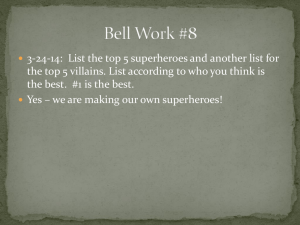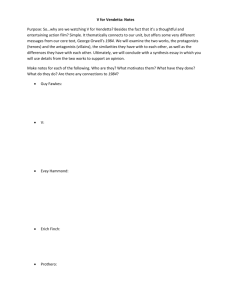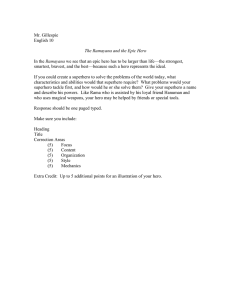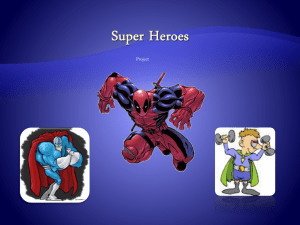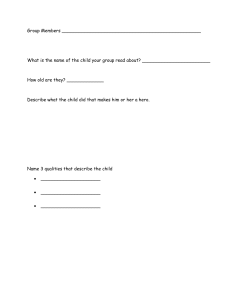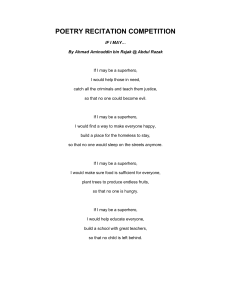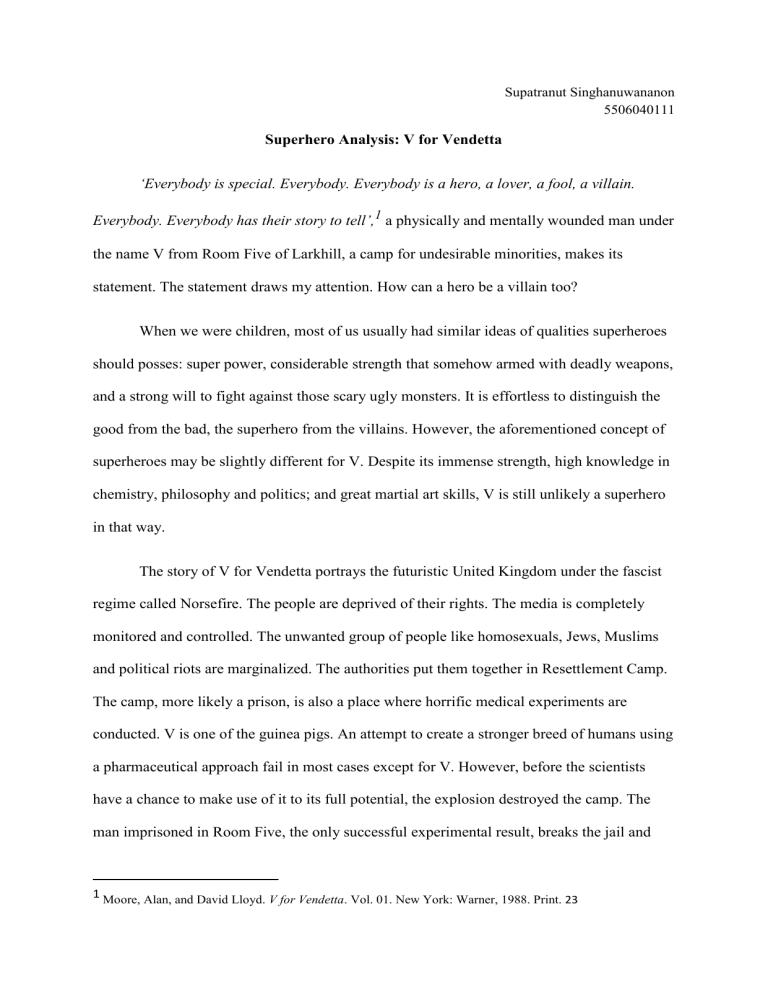
Supatranut Singhanuwananon 5506040111 Superhero Analysis: V for Vendetta ‘Everybody is special. Everybody. Everybody is a hero, a lover, a fool, a villain. Everybody. Everybody has their story to tell’,1 a physically and mentally wounded man under the name V from Room Five of Larkhill, a camp for undesirable minorities, makes its statement. The statement draws my attention. How can a hero be a villain too? When we were children, most of us usually had similar ideas of qualities superheroes should posses: super power, considerable strength that somehow armed with deadly weapons, and a strong will to fight against those scary ugly monsters. It is effortless to distinguish the good from the bad, the superhero from the villains. However, the aforementioned concept of superheroes may be slightly different for V. Despite its immense strength, high knowledge in chemistry, philosophy and politics; and great martial art skills, V is still unlikely a superhero in that way. The story of V for Vendetta portrays the futuristic United Kingdom under the fascist regime called Norsefire. The people are deprived of their rights. The media is completely monitored and controlled. The unwanted group of people like homosexuals, Jews, Muslims and political riots are marginalized. The authorities put them together in Resettlement Camp. The camp, more likely a prison, is also a place where horrific medical experiments are conducted. V is one of the guinea pigs. An attempt to create a stronger breed of humans using a pharmaceutical approach fail in most cases except for V. However, before the scientists have a chance to make use of it to its full potential, the explosion destroyed the camp. The man imprisoned in Room Five, the only successful experimental result, breaks the jail and 1 Moore, Alan, and David Lloyd. V for Vendetta. Vol. 01. New York: Warner, 1988. Print. 23 kills the officials. After the incident, it decides to hide its true identity by donning a Guy Fawkes mask and officially becomes known as V as it is the Roman numeral for five. Obviously, for it, V is for vendetta as well. The story does not give a clear background of V before it is placed in the camp. However, as the story develops, the marginalized, tortured and distorted V gradually reveals its complex characteristics. We can see both hard and soft sides of the character. V displays its violence and viciousness in many scenes. According to its introduction to Evey, the young prostitute it saves from being raped and later becomes its confidante, V affirms that its determination is to wreak its vengeance on the fascist government: “…the only verdict is vengeance; a vendetta held as a votive, not in vain, for the value and veracity of such shall one day vindicate the vigilant and the virtuous”.2 The vengeance includes killing and bombing. It kills many government officials. In order to ultimately demolish the power of the government, it bombs the Parliament. While we almost judged V from its heartless terrorist acts, in some scenes, V unfolds its sentimental side. After Evey decides to leave for no obvious reason, V puts off the mask, throws it at a mirror and bursts into tears. The combination of its roughness and sensitivity that is displayed makes the character more real and convincing. Hence, V is not at all a flat character, but distinctively sophisticated. Even though V primarily fights against the government for its own revenge, its action also awakens the people’s doubt in their government. There is a time when V hacks the government’s main broadcasting channel to deliver its speech, “Good evening, London. Allow me first to apologize for this interruption. I do, like many of you, appreciate the comforts of every day routine- the security of the familiar, the tranquility of repetition. I enjoy them as much as any bloke… And where once you had the freedom to object, to think 2 "Memorable Quotes: V for Vendetta (2005)." IMDb. IMDb.com, n.d. Web. 01 Aug. 2012. <http://www.imdb.com/title/tt0434409/quotes>. and speak as you saw fit, you now have censors and systems of surveillance coercing your conformity and soliciting your submission. How did this happen? Who's to blame? Well certainly there are those more responsible than others, and they will be held accountable, but again truth be told, if you're looking for the guilty, you need only look into a mirror.”3 The speech highly motivates the passive people, who once only do whatever the authorities command, to think critically and stand up for their right. The speech also revives the sense of being humans and not controllable robots. This results in people’s coalition, largely formed a year after V’s speech has been broadcasted, to rise against their vicious fascist government. V is not only a superhero behind a mask. V is a provocative idea that challenges every state where its people forfeit their basic rights. Men perish, but solid established ideas do not; and that makes V a great hero. As mentioned, V is not a mere superhero in a form of a man, flaunting its great power in a fancy costume. It is the idea that everybody in like society can relate to. The idea of liberation that V conveys impacts on my thoughts. From my observation, Thailand underwent the similar situation in 1973 in which the people’s uprising was so powerful that it overthrew the military government. This is historic proof that any idea that is solid enough to be transformed into action can change the society. I believe that men are born free and equal. Our liberty should never be taken away from us by any one for any cause. Thus, whenever any government or rulers try to curtail our freedom to think, the society would need a superhero like V to shake our thoughts, and provoke our action to take back what belongs to us. Now to answer the question, how can a hero be a villain too? V provides me a certain perspective. Like V says, there are both a hero and a villain in all of us no matter who we are. 3 Ibid. It reinforces the fact that people are different in their own ways. V’s message decoded: our society is in desperate need of room for differences.
